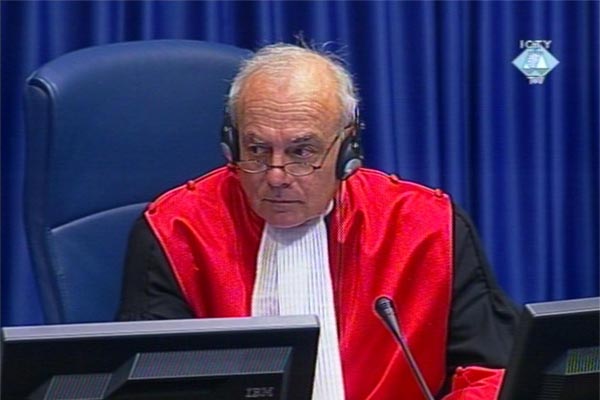Home
ANTONETTI FOR CONTINUATION OF SESELJ TRIAL
The Trial Chamber in the Seselj case decided with a majority of votes to proceed with the trial of the Serbian Radicals’ leader on all counts in the indictment. In a partially dissenting opinion, the presiding judge says he would acquit Seselj now, after the prosecution has rested its case, of the charges in six counts in the indictment. Antonetti would continue the trial on the charges of persecution, deportation and forcible transfer
 Jean-Claude Antonetti, presiding judge in the Seselj trial
Jean-Claude Antonetti, presiding judge in the Seselj trial According to French judge Antonetti, the trial of Vojislav Seselj would continue on only three of the nine counts in the indictment for crimes in Croatia, BH and Vojvodina. Judge Antonetti found that the prosecution called enough evidence on the counts of persecution, deportation and forcible transfer to allow a ‘reasonable judge’ to convict the accused of those charges. However, the presiding judge contends there was not enough of Seselj’s responsibility for murder, torture, cruel treatment, destruction of towns and villages, destruction of religious buildings and looting. The majority of the Trial Chamber, judges Harhoff and Lattanzi, decided yesterday to proceed with the trial on all counts in the indictment.
Judge Antonetti believes that the trial should continue only on the three counts in the indictment, on the basis of the evidence about Seselj’s hate speech against non-Serbs in his public addresses. According to Antonetti, if Seselj failed to refute the prosecution case, he could be convicted under three modes of responsibility: for instigating, committing and aiding and abetting persecution, deportation and forcible transfer but not for planning and ordering. The presiding judge referred to the speeches the accused made between 1991 and 1993 in which he called for the killing of Croatian civilians and the expulsion of Croats from the Serb-controlled territory.
At the same time, Antonetti thinks there is not enough evidence of Seselj’s responsibility for other crimes. In fact, according to him, there is evidence supporting the opposite claim, that Seselj didn’t exercise any control over the individuals who committed crimes, and that in his speeches Seselj condemned those who were guilty of murder, looting and ethnic cleansing, primarily Arkan and his men.
It was interesting to see that according to Antonetti, Seselj should be acquitted right now of the charge that he took part in the joint criminal enterprise whose goal was to expel Serbs from large parts of Croatia and BH and from the village of Hrtkovci in Vojvodina. Here the French judge relied primarily on the transcript of Seselj’s evidence at the trial of Slobodan Milosevic. Antonetti noted that the 1092-page document was ‘more relevant than the testimony of any other witness, be they victims or experts’, because they were not close to the group that implemented the goals of the joint criminal enterprise, as alleged in the indictment. After carefully studying the transcript, Antonetti was convinced that Milosevic’s motto, ‘all Serbs in one state (i.e. Yugoslavia)’ and Seselj’s idea of ‘a Greater Serbia’ were not part of the same goal and that Milosevic and Seselj could not be participants in the same criminal enterprise.
After reading out the 73 pages of his separate opinion, the presiding judge said that the ‘ball is now in the court of the accused’. Seselj should submit his list of witnesses and exhibits by 17 June 2011, because the defense case is slated to start after the Tribunal’s summer recess. Seselj indicated he had no intention of calling any evidence unless his five requirements were met: resolving the status of his legal advisors, payment of retroactive defense fees and expenses to the amount of € 1,300 000, disclosure of the contempt of court indictment against him which was issued and withdrawn in 2005, re-disclosure of the documents that the prosecution disclosed to him erroneously and then seized them the same year, and finally, the translation of two of his books into English. If those requirements are met, Seselj will ask for two years to prepare his case; he will call 100 witnesses and take 120 hours to examine them. If the Tribunal refuses to comply with his demands, Seselj will deliver his opening statement and the closing argument. The presiding judge said the Trial Chamber would consider Seselj’s requests. The next hearing will be scheduled ‘in due time’.
Linked Reports
- Case : Seselj
- 2011-05-04 SESELJ’S MOTION FOR ACQUITTAL REJECTED
- 2011-03-25 JUDGE ANTONETTI’S DARK THOUGHTS
- 2011-03-16 SESELJ REFUSES TO SEE CARDIOLOGIST WHOSE NATIONALITY IS “A PROBLEM”
- 2011-05-18 SESELJ TO GET MONEY IN A ‘DANGEROUS PRECEDENT’
- 2011-10-26 AMICUS CURIAE: NO GROUNDS FOR CONTEMPT CASE AGAINST CARLA DEL PONTE AND HER PROSECUTORS
- 2011-10-28 SESELJ’S COMMUNICATIONS WILL BE MONITORED
